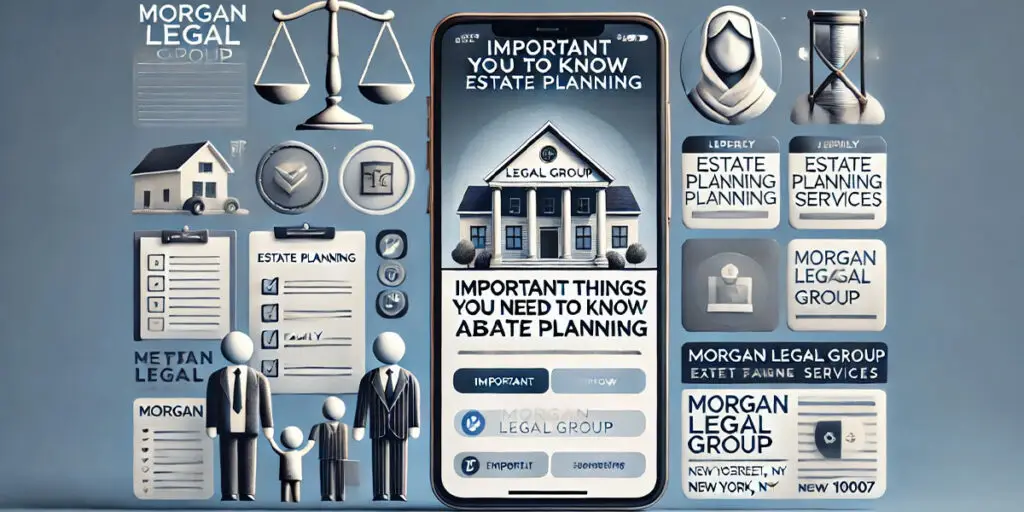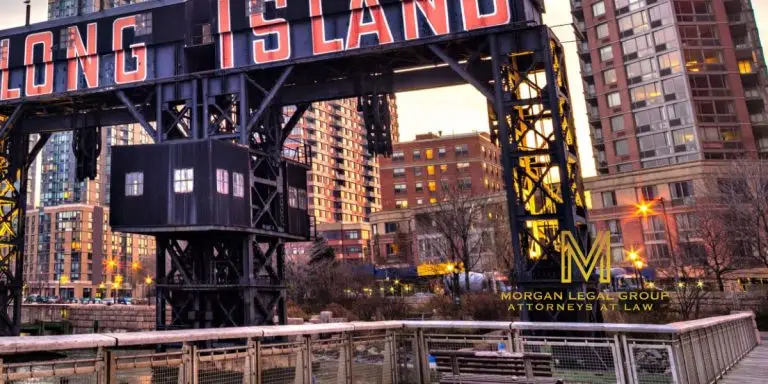Top 10 Things NYC Residents Need to Know About Estate Planning
Often perceived as complex or daunting, estate planning is fundamentally about ensuring your wishes are honored and your loved ones are protected. Indeed, for residents of New York City, estate planning is not a luxury; it’s a vital necessity. Navigating life in a dynamic and high-cost environment like NYC underscores the critical importance of proactively planning for your future and the well-being of your family. Morgan Legal Group, a leading estate planning law firm in New York City, is dedicated to simplifying estate planning and making it accessible to everyone in NYC. We believe that understanding the key aspects of estate planning empowers you to make informed decisions and take control of your future. This informative blog post will outline the top 10 essential things every NYC resident needs to know about estate planning. We will demystify the process, highlight crucial considerations specific to New York, and provide actionable insights to help you create a solid estate plan that provides peace of mind and security for you and your family.
1. Estate Planning is Not Just for the Wealthy: Protecting Everyone
A common misconception is that estate planning is only for the wealthy. This is simply untrue. Estate planning is not solely about vast fortunes; it is about ensuring that everyone, regardless of their net worth, has a plan in place to protect themselves and their loved ones.
Why Estate Planning Benefits Everyone in NYC
Regardless of their financial status, estate planning offers vital benefits for all NYC residents.
Protecting Your Loved Ones: Providing for Family Security
Estate planning is fundamentally about protecting your loved ones. It ensures your spouse, children, or other beneficiaries are provided for according to your wishes after your passing. A well-crafted estate plan minimizes family conflict and ensures a smooth transition for your heirs during an already difficult time, regardless of the size of your estate.
Directing Asset Distribution: Ensuring Your Wishes are Honored
Estate planning empowers you to decide how your assets will be distributed rather than leaving those decisions to New York State law. A will or trust allows you to specify who inherits your property when they inherit it, and how it is managed, ensuring your wishes are legally documented and honored, no matter the value of your assets.
Planning for Incapacity: Managing Your Affairs While You’re Alive
Estate planning is not just about death; it also includes incapacity planning. Documents like a Durable Power of Attorney and Healthcare Proxy ensure your financial and healthcare decisions are managed by trusted individuals if you cannot do so yourself due to illness or accident. Incapacity planning is crucial for everyone, regardless of age or wealth, to protect their autonomy and well-being during their lifetime.
Therefore, estate planning is not a privilege for the wealthy; it is a responsible and essential step for everyone in NYC who wants to protect their loved ones, control their assets, and plan for the unexpected.
2. Wills are Essential, But Not Always Sufficient in NYC: Consider Trusts
Wills are foundational estate planning documents; every NYC resident should have one. However, for many, especially those with more complex estates or a desire for probate avoidance, wills alone may not be sufficient. Living Trusts offers powerful alternatives and can be a cornerstone of comprehensive NYC estate plans.
Understanding the Role and Limitations of Wills in NYC
Wills are essential, but understanding their limitations is key to effective estate planning.
Wills: Directing Asset Distribution After Probate
A will is a legal document that specifies how your assets should be distributed after your death. It names beneficiaries and an executor to manage your estate. However, wills in New York must go through probate, a public court process, to be validated and implemented.
Probate in NYC: Time-Consuming, Costly, and Public
Probate in NYC can be lengthy, expensive, and public. It involves court fees, executor commissions, attorney fees, and potential delays. Probate records, including your will, become public records, which many NYC residents prefer to avoid for privacy reasons.
Limitations of Wills: Lack of Privacy and Probate
While essential for directing asset distribution, it will not avoid probate. They become public records and can be subject to will contests and delays in the probate process. Living Trusts offer significant advantages for NYC residents seeking probate avoidance, privacy, and greater control.
Living Trusts: A Powerful Alternative for Probate Avoidance and Control
Living Trusts, also known as Revocable Trusts, offer a compelling alternative to wills, particularly for probate avoidance and enhanced control.
Living Trusts: Bypassing Probate and Ensuring Privacy
Living Trusts allow you to transfer assets into a trust during your lifetime. Assets held in a living trust bypass probate entirely, passing directly to your beneficiaries, privately and efficiently. This probate avoidance is a major advantage in NYC, saving time and money and ensuring privacy.
Greater Control and Flexibility with Trusts
Living Trusts offer greater control over asset distribution than wills. You can specify *how* and *when* beneficiaries receive assets, not just *who* inherits. Trusts are also more flexible and can be tailored to address complex family situations or long-term asset management needs, offering advantages wills cannot provide.
Combining Wills and Trusts: A Comprehensive Approach
Often, the most effective estate plan involves a combination of a will and a living trust. A “Pour-Over Will” can be used with a living trust to catch any assets not initially funded into the trust, ensuring all assets are ultimately managed according to your overall estate plan. This combination provides both probate avoidance (through the trust) and a safety net (through the will).
Exploring Living Trusts in conjunction with a will is highly recommended for NYC residents seeking to maximize control, ensure privacy, and streamline estate administration. Morgan Legal Group can advise you on whether a living trust is right for your needs.
3. Estate Planning is More Than Just Asset Distribution: Incapacity Planning is Key
Estate planning is often narrowly viewed as solely focused on asset distribution after death. However, a truly comprehensive estate plan also includes crucial incapacity planning, ensuring your well-being and wishes are protected during your lifetime if you become unable to make decisions for yourself. Incapacity planning is just as important, if not more so, than planning for after you are gone.
Essential Incapacity Planning Documents for NYC Residents
Incapacity planning involves key legal documents that empower you to control your affairs even if you become incapacitated.
Durable Power of Attorney: Managing Your Finances
A Durable Power of Attorney designates an agent to manage your financial affairs if you become incapacitated. This agent can pay bills, manage investments, and handle other financial matters on your behalf, ensuring your finances are taken care of if you cannot manage them yourself. The “durable” aspect means it remains effective even after incapacity.
Healthcare Proxy: Making Medical Decisions for You
A Healthcare Proxy appoints a healthcare agent to make medical decisions for you if you become unable to communicate your wishes. This agent can access your medical records, discuss treatment options with doctors, and make healthcare decisions aligned with your values. A Healthcare Proxy ensures your medical care is managed by someone you trust, according to your preferences.
Living Will: Expressing Your End-of-Life Care Wishes
A Living Will allows you to document your wishes regarding end-of-life medical treatment. It outlines your preferences for life support, artificial nutrition, and other end-of-life care decisions. A Living Will ensures your wishes regarding these critical medical decisions are known and honored, even if you cannot communicate them directly.
Why Incapacity Planning is Crucial in NYC
Incapacity planning is particularly important for NYC residents due to the fast-paced and demanding nature of city life.
Protecting Your Autonomy and Control During Your Lifetime
Incapacity planning documents empower you to maintain control over your financial and healthcare decisions, even if you lose the ability to make those decisions directly. They ensure your wishes are respected and your affairs are managed according to your values, protecting your autonomy and self-determination.
Avoiding Guardianship Proceedings: A Costly and Public Process
Without incapacity planning documents, your loved ones may need to go to court to seek guardianship if you become incapacitated. Guardianship proceedings are public, time-consuming, costly, and can be emotionally stressful. Proper incapacity planning avoids the need for guardianship, keeping your affairs private and managed by your chosen agents, not the court.
Ensuring Your Loved Ones Can Act on Your Behalf
Incapacity planning documents empower your loved ones to act on your behalf, making financial and healthcare decisions when you cannot. This avoids confusion, delays, and potential family disputes during a stressful time, providing clarity and support for your family when they need it most.
Therefore, don’t overlook incapacity planning in your estate plan. Durable Powers of Attorney, Healthcare Proxies, and Living Wills are essential documents for protecting yourself and your loved ones in NYC. Morgan Legal Group can help you create a comprehensive incapacity plan.
4. Estate Planning is Not Just for Seniors: Plan at Any Age
Many people mistakenly believe estate planning is something to consider only in old age. However, the reality is that estate planning is relevant and beneficial at any age and starting sooner rather than later is always advisable. Life is unpredictable, and unforeseen events can occur anytime, making estate planning a responsible step for adults of all ages, especially in NYC.
Benefits of Early Estate Planning: Protecting Yourself and Your Family Sooner
Procrastinating on estate planning can have significant consequences. Planning at any age offers crucial advantages.
Protecting Young Families: Planning for Minor Children
Estate planning is particularly critical for young families with minor children. A will allows you to nominate guardians for your children, ensuring they are cared for by individuals you trust if something happens to you and your spouse. Estate planning also allows you to establish trusts to manage assets for your children’s benefit until they reach adulthood, providing financial security and responsible asset management for your young family.
Planning for Unexpected Incapacity at Any Age
Incapacity can occur at any age due to accidents, illnesses, or unforeseen events. Incapacity planning documents, like Powers of Attorney and Healthcare Proxies, are essential for adults of all ages to ensure their financial and healthcare decisions are managed by trusted individuals if they cannot make those decisions themselves. Proactive incapacity planning protects your autonomy and well-being, regardless of your age or health status.
Building a Solid Foundation: Peace of Mind at Every Stage of Life
Estate planning provides peace of mind at every stage of life. Knowing you have a plan in place, no matter your age, reduces stress and uncertainty about the future. Early estate planning allows you to build a solid foundation for your financial security and family protection, adapting and updating your plan as your life evolves and your needs change over time. It’s never too early to start planning for your future and the well-being of your loved ones.
Therefore, don’t wait until you are older to consider estate planning. Start planning now, at any age, to protect yourself, your family, and your future in NYC. Morgan Legal Group can help you create an estate plan tailored to your current needs and future goals, regardless of your age.
5. Estate Planning is a Dynamic Process, Not a One-Time Event: Regular Updates are Key
Estate planning is not a static, set-it-and-forget-it task. Instead, it is a dynamic and ongoing process that requires periodic review and updates to ensure your plan remains current, effective, and aligned with your evolving life circumstances and wishes. Life changes, laws change, and your estate plan should adapt accordingly to remain relevant and achieve your intended goals.
Life Events That Trigger Estate Plan Reviews and Updates
Certain life events should prompt you to review and potentially update your estate plan to reflect your changed circumstances.
Marriage, Divorce, or Remarriage: Significant Family Changes
Marriage, divorce, or remarriage are major life events that necessitate reviewing and updating your estate plan. Marriage creates new legal and financial considerations regarding spousal inheritance and beneficiary designations. Divorce requires updating beneficiary designations, powers of attorney, and healthcare proxies to reflect your changed marital status and ensure your former spouse is no longer involved in your estate plan. Remarriage brings complexities of blended families and stepchildren, requiring careful planning to ensure all family members are provided for according to your wishes.
Birth or Adoption of Children or Grandchildren: Adding New Family Members
The birth or adoption of children or grandchildren is a joyous event that also necessitates estate plan updates. You will want to include new children or grandchildren as beneficiaries in your will or trust and consider establishing trusts to manage assets for minor children’s benefit. Guardianship nominations for minor children are also a crucial aspect of estate planning for parents with young children.
Significant Changes in Assets or Finances: Adjusting Your Plan to Your Wealth
Significant changes in your assets, income, or financial situation should trigger a review of your estate plan. Major asset acquisitions, inheritances, business ventures, or substantial changes in investment portfolios may necessitate adjustments to your estate plan to optimize tax planning, asset management, and distribution strategies. Conversely, significant financial losses or changes in your financial needs may also require estate plan modifications.
Relocation to a New State: Considering Different State Laws
If you move permanently from New York City or New York State to a new state, having your estate plan reviewed by an attorney in your new state of residence is advisable. Estate laws vary by state, and specific aspects of your New York estate plan may need to be updated or revised to comply with your new state’s laws and ensure your plan remains effective and legally sound in your new jurisdiction.
Changes in Estate Planning Laws: Keeping Up with Legal Updates
Estate planning laws, both at the federal and New York State level, can change over time due to legislative updates or court decisions. It is prudent to periodically review your estate plan with your attorney to ensure it remains aligned with current laws and takes advantage of any new estate planning opportunities or tax benefits that may have arisen due to changes in legislation or regulations. Regular reviews with your attorney ensure your estate plan remains up-to-date and legally optimized.
Make estate plan reviews a regular part of your financial and legal checkups. Treat it as an ongoing process, not a one-time task, to ensure your plan remains effective and reflects your current wishes and circumstances throughout your life. Morgan Legal Group offers ongoing estate plan review services to help you keep your plan current and effective.
6. Digital Assets are Now Part of Estate Planning: Don’t Overlook Your Online Life
In today’s digital age, our lives extend far beyond the physical realm. We conduct business online, maintain social connections through digital platforms, and accumulate valuable assets that exist purely in cyberspace. These digital assets, ranging from cryptocurrency holdings to cherished family photos stored in the cloud, represent a significant part of our estate. Therefore, just as you meticulously plan for the distribution of your tangible possessions, it is now critically important to incorporate your digital assets into your estate plan, especially if you reside in tech-forward New York City.
Understanding and Planning for Your Digital Assets
Digital assets are no longer optional to consider; they are a core component of modern estate planning.
Inventorying Your Digital Assets: Knowing What You Have
The first step in digital estate planning is to create a comprehensive inventory of your digital assets. This includes online financial accounts, cryptocurrency wallets, social media profiles, email accounts, cloud storage, digital photos and videos, domain names, and other online properties that hold monetary or sentimental value. Documenting all your digital assets is crucial to ensure they are not overlooked in your estate plan.
Documenting Access Information Securely: Usernames and Passwords
Simply listing your digital assets is not enough. You must also securely document the necessary access information for your chosen fiduciary to manage these assets after your passing or in case of incapacity. This includes usernames, passwords, security questions, and recovery keys. Store this access information securely and separately from your will, using password managers, encryption, or lawyer-secured storage methods to protect sensitive data during your lifetime.
Granting Fiduciary Access and Authority: Legal Considerations
Your estate plan must legally authorize your chosen fiduciary (executor, trustee, or digital executor) to access and manage your digital assets. Include specific clauses in your will, trust, or power of attorney granting this authority, referencing New York’s Fiduciary Access to Digital Assets Law to strengthen their legal standing. Clearly outline your wishes regarding social media, email, and other online accounts, specifying whether you want them memorialized, deleted, or transferred to beneficiaries.
Ignoring digital assets in your estate plan is a significant oversight in the modern age. Proactive digital estate planning is essential to protect your online legacy, ensure your wishes are honored for your digital life, and provide your loved ones with the necessary access and authority to manage your digital footprint during estate administration. Morgan Legal Group specializes in digital asset estate planning and can guide you through this evolving area of law.
6. Transparency and Communication with Loved Ones: Avoiding Family Surprises
Estate planning is not just about legal documents; it’s also about family communication and transparency. Indeed, open and honest conversations with your loved ones about your estate plan are crucial to prevent misunderstandings, minimize potential family conflicts, and ensure your wishes are clearly understood and respected by those you care about most. Transparency and communication can be as important as the legal documents themselves in ensuring a harmonious and effective estate plan.
The Importance of Family Conversations in Estate Planning
Open communication with your family is a vital, often overlooked, part of estate planning.
Discussing Your Wishes with Your Executor and Healthcare Agent
Have detailed conversations with the individuals you named your executor, trustee, power of attorney agent, and healthcare proxy. Ensure they understand their roles, responsibilities, and wishes as outlined in your estate planning documents. Open communication with these key individuals allows them to prepare for their future roles and ensures they are aligned with your intentions and values.
Communicating Your Intentions to Beneficiaries (When Appropriate)
If appropriate for your family dynamics, consider discussing your estate plan with your primary beneficiaries, especially your spouse and adult children. Transparency about your intentions can prevent surprises, address potential questions or concerns proactively, and minimize the risk of disputes or hurt feelings after your passing. Open communication fosters understanding and can strengthen family relationships during a sensitive time.
Explaining Your Values and Reasoning Behind Your Decisions
Beyond simply stating *what* is in your estate plan, take the time to explain *why* you have made certain decisions. Share your values, motivations, and reasoning behind your choices regarding asset distribution, guardianship nominations, healthcare preferences, and charitable giving. Understanding the “why” behind your decisions can comfort and reassure your loved ones, helping them appreciate your thoughtful planning and reducing the likelihood of misunderstandings or disagreements based on a lack of context.
Open communication and transparency are not always easy but invaluable components of responsible estate planning. Proactive conversations with your loved ones can strengthen family bonds, prevent misunderstandings, and ensure your estate plan is legally sound, emotionally intelligent, and family-centered. Morgan Legal Group can help you navigate these sensitive family conversations as part of your estate planning process.
8. Don’t DIY Estate Planning in NYC: Expert Legal Counsel is Crucial
While online resources and DIY estate planning templates may seem tempting, estate planning is not a do-it-yourself project, particularly in a complex legal environment like New York City. Indeed, attempting to create your own estate plan without expert legal counsel can be risky, potentially leading to costly errors, unintended consequences, and a flawed estate plan that fails to achieve your intended goals. Engaging an experienced NYC estate planning attorney is not an unnecessary expense but a crucial investment in protecting yourself, your family, and your legacy.
Risks of DIY Estate Planning and Why an Attorney is Essential
DIY estate planning can lead to significant problems. Expert legal counsel is vital for creating a sound plan.
Complex New York State Laws and Requirements
New York State has specific and often complex laws governing wills, trusts, probate, powers of attorney, healthcare proxies, and estate taxes. DIY estate planning templates and generic online forms often fail to adequately address these state-specific legal requirements, potentially resulting in invalid, unenforceable documents or failing to achieve your intended legal outcomes under New York law. Navigating the intricacies of New York estate law requires the expertise of a qualified NYC attorney.
Potential for Costly Errors and Unintended Consequences
Estate planning is nuanced and involves numerous legal and tax considerations that are easy to overlook without expert guidance. DIY estate plans are prone to errors, omissions, and ambiguities that can lead to unintended consequences, including increased taxes, probate complications, family disputes, and legal challenges to your estate plan after your passing. Correcting these errors after it is too late can be far more costly than investing in expert legal counsel upfront.
Lack of Personalized Advice and Tailored Solutions
DIY estate planning is inherently generic and cannot provide the personalized advice and tailored solutions that a qualified attorney offers. Online templates cannot assess your individual circumstances, financial situation, family dynamics, and specific estate planning goals. A NYC estate planning attorney takes the time to understand your unique needs and craft a customized estate plan that precisely addresses your individual situation and achieves your specific objectives, providing a level of personalization and strategic planning that DIY methods cannot replicate.
Therefore, protect yourself and your family by investing in expert legal counsel for your NYC estate plan. Morgan Legal Group’s experienced attorneys provide the personalized guidance and legal expertise you need to create a sound and effective estate plan tailored to your unique circumstances.
9. Estate Planning is an Act of Love and Responsibility: Peace of Mind for You and Your Family
While sometimes perceived as a morbid or uncomfortable topic, estate planning is fundamentally an act of love and responsibility towards your family and loved ones. Indeed, creating an estate plan is one of the most thoughtful and caring things you can do to protect your family’s future, provide for their well-being, and ensure a smooth transition for them during an inevitably difficult time. Estate planning is not about death but life, family, and legacy.
The Emotional and Practical Benefits of Having a Plan in Place
Estate planning provides invaluable peace of mind and security for both you and your family.
Providing Security and Financial Protection for Your Loved Ones
At its heart, estate planning provides security and financial protection for your loved ones. A well-crafted estate plan ensures your spouse, children, or other beneficiaries are provided according to your wishes, minimizing financial uncertainty and hardship for them after your passing. Knowing you have taken proactive steps to secure your family’s financial future offers immense peace of mind and lets you focus on living your life to the fullest, knowing your loved ones will be cared for.
Reducing Stress and Burden on Your Family During Grief
Estate administration and navigating legal and financial complexities after losing a loved one can be incredibly stressful and burdensome for grieving families. A comprehensive estate plan simplifies this process significantly, reducing administrative hassles, minimizing potential family conflicts, and providing clear guidance for your executor and loved ones. Proactively planning alleviates a significant burden on your family during an already emotionally challenging time, allowing them to focus on grieving and healing rather than being overwhelmed by complex legal and financial matters.
Ensuring Your Wishes are Honored and Your Legacy Preserved
Estate planning ensures your personal wishes are honored, and your values are reflected in how your assets are managed and distributed. A will, trust, and advance healthcare directives allow you to articulate your preferences clearly and legally, ensuring your voice is heard, and your choices are respected, even after you are gone. Estate planning is about preserving your legacy, ensuring your values and intentions are carried forward, and positively impacting the world and your loved ones according to your carefully considered design.
Therefore, I view estate planning not as a task to be dreaded but as an act of love, foresight, and responsibility. It is a gift you give to yourself and your family, providing lasting security, clarity, and peace of mind. Morgan Legal Group is here to help you create an estate plan that reflects your love, values, and wishes, ensuring your legacy is protected and your family is cared for.
10. Take Action Now: Don’t Procrastinate on Estate Planning in NYC
The most important thing to know about estate planning in NYC is the critical importance of taking action *now*. Procrastination is the biggest enemy of effective estate planning. Indeed, delaying estate planning can have significant negative consequences, leaving you and your family vulnerable to unnecessary risks, financial burdens, and emotional distress. Therefore, the time to plan your estate is not “someday,” but today. Do not delay in taking this essential step to protect your future and the well-being of your loved ones.
The Urgency of Proactive Estate Planning: Why Delay is Risky
Delaying estate planning can have serious repercussions. Proactive planning offers crucial advantages.
Life is Unpredictable: Incapacity or Unexpected Events Can Occur at Any Time
Life is inherently unpredictable, and unforeseen events, such as accidents, illnesses, or sudden incapacity, can occur at any age, without warning. Delaying estate planning in the hope of “getting around to it later” is a risky gamble. Incapacity can strike unexpectedly, leaving you without crucial incapacity planning documents in place, potentially leading to court intervention and loss of control over your financial and healthcare decisions. Similarly, death can occur unexpectedly, leaving your loved ones to navigate a complex and potentially costly probate process without a clear will or estate plan to guide them. Proactive estate planning addresses these uncertainties and ensures you are prepared for the unexpected whenever it may occur.
Lost Opportunities for Asset Protection and Tax Savings
Delaying estate planning can lead to missed opportunities for implementing valuable asset protection and tax minimization strategies. Certain estate planning tools, such as Medicaid Trusts or Irrevocable Life Insurance Trusts (ILITs), require proactive and early planning to be most effective, often due to look-back periods or specific legal requirements. Procrastinating on estate planning may mean you miss the window to implement these strategies effectively, potentially resulting in higher estate taxes, unnecessary asset depletion, or lost opportunities to maximize wealth preservation for your heirs. Early planning allows you to take full advantage of available legal and tax benefits, optimizing your estate plan for maximum effectiveness.
Increased Stress and Burden on Loved Ones During Grief
Failing to create an estate plan or delaying its implementation inevitably places a greater burden and stress on your loved ones during an already emotionally challenging time after your passing. Without a will or trust in place, your family may face a lengthy, costly, and public probate process, increased administrative hassles, potential family disputes, and uncertainty about your wishes. Procrastination in estate planning is, in effect, procrastinating on alleviating potential stress and burden for your family during their time of grief. Taking action now to create a comprehensive estate plan is an act of love and consideration for your loved ones, simplifying estate administration for them and providing clarity and peace of mind when they need it most.
Therefore, seize the moment and take action on your estate plan today. Do not delay this essential step any longer. Contact Morgan Legal Group to schedule a consultation and begin the process of creating a comprehensive and personalized estate plan that protects your future, secures your legacy, and provides lasting peace of mind for you and your family in NYC. Your future self and your loved ones will thank you for taking this crucial step now.







